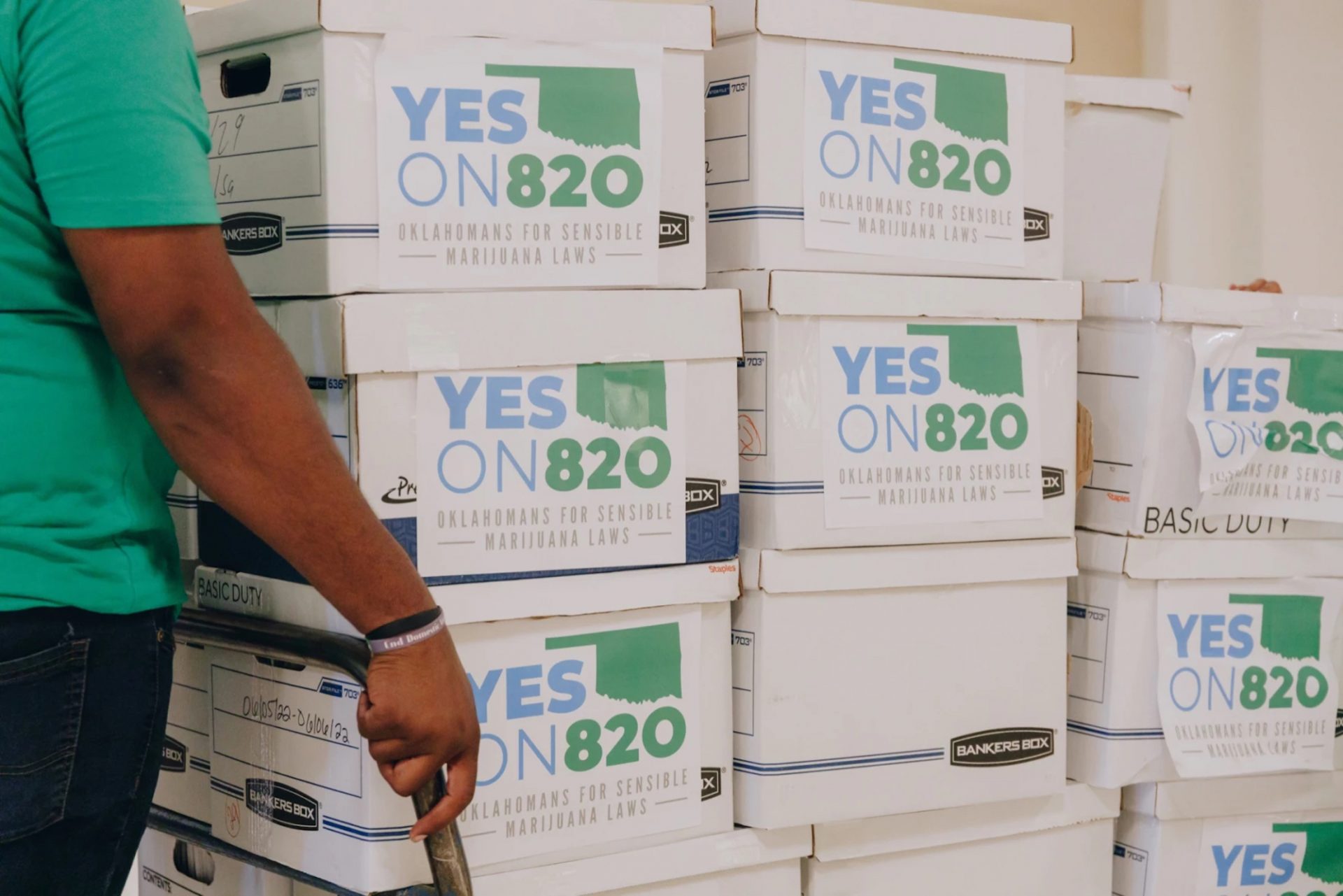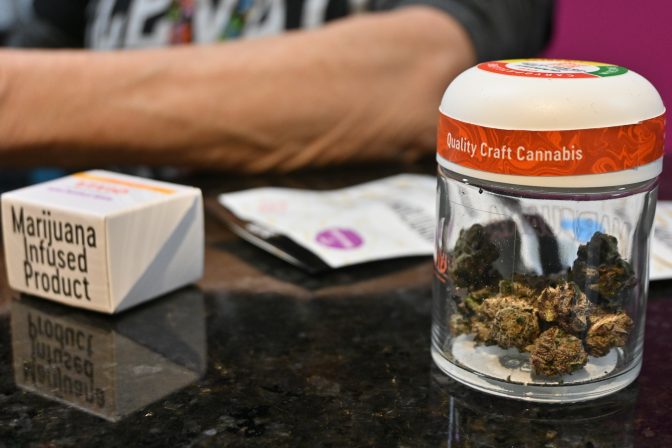
Supporters of State Question 820 turn in signatures to the Oklahoma Secretary of State in July 2022.
Yes On 820 Campaign


Supporters of State Question 820 turn in signatures to the Oklahoma Secretary of State in July 2022.
Yes On 820 Campaign
Oklahomans will have a decision to make next week: Should recreational marijuana be legalized?
State Question 820 would make it legal for people to have up to one ounce of weed for adult use, grow up to six cannabis plants and create a pathway to expunge some prior marijuana offenses.
It’s unclear what voters will do. When Oklahomans narrowly voted to approve State Question 788, which legalized medical marijuana, regulators were caught flat-footed. But there’s been a boom in business and with it a boom in tax revenues for the state that has paid for things like school facilities. Pot businesses have also become a central part of the state: There are more here than anywhere else in the country.
Oklahoma is a conservative state, and some Republican leaders, like Gov. Kevin Stitt, have come out in opposition to the state question.
“The big reason for me is, No. 1, it’s illegal federally,” he said at a recent press conference. “There shouldn’t be a patchwork of states doing different things. We need to let the feds tell us if it’s legal or illegal, we shouldn’t let the states tell us that.”
In November, Oklahoma’s neighbors Missouri and Arkansas had similar state questions on the ballot. But the results in both of those states were different. Voters in Missouri legalized recreational cannabis, while voters in Arkansas did not.
Those two elections – and how they played out – could be an indicator of what’s to come in Oklahoma.

Kateleigh Mills / KOSU
Bags of cannabis sit in crates at Nirvana Cannabis Dispensary’s Tulsa-based warehouse.
Why did Arkansas voters reject its ballot initiative?
Despite Responsible Growth Arkansas, the organization behind the ballot initiative, spending more than $13 million on its campaign, 60% of Arkansas voters rejected the proposal.
“It was one of our most expensive direct democracy campaigns in recent history,” said Janine Parry, a political science professor and the director of the Arkansas Poll at the University of Arkansas. “But there also was some opposition that spent a lot of money.”
Opposition groups spent millions for different reasons.
Longtime cannabis supporters, who typically lean Democrat, were frustrated by a number of components on Arkansas’ ballot initiative, Parry said. The proposal didn’t include a route to expunge previous marijuana offenses and continued to outlaw growing cannabis.
Longtime cannabis opponents formed a coalition with those more liberal groups. Traditional conservatives like former Gov. Asa Hutchinson, the State Chamber of Commerce and the Farm Bureau all came out in opposition.
Arkansas’ ballot initiative also included provisions that would’ve made tax revenue go toward funding law enforcement, which failed to attract as many conservative votes as the organization hoped for.
“With some groups on some issues, it doesn’t matter how you sweeten the pot, you know, they’re still a no,” Parry said. “And in this case, the sweetening of the pot actually turned off a slim portion of their natural supporters.”
Despite the failed ballot initiative, Parry said public opinion polls she’s conducted show Arkansas voters are supportive of legalizing recreational marijuana, and she suspects another citizen ballot initiative will arise soon and look similar to Oklahoma’s.

Carlos Moreno / KCUR
An employee at Fresh Green dispensary checks out a customer purchasing a variety of different recreational cannabis products on Feb. 3, 2023.
The same night Arkansas’ ballot initiative failed, Missourians voted to become the 21st state to legalize recreational marijuana, with the initiative receiving 53% of the vote.
John Payne, director of Legal Missouri 2022, the campaign behind Missouri’s legalization amendment, said it was key for the campaign to tailor a ballot initiative that was a little more attuned to Republican voters without losing Democratic voters, its main supporters.
“No matter what your political ideology, there are things about legalizing marijuana that can appeal to you,” Payne said. “For a liberal, it may be more about criminal justice reform, and for conservatives, it might be more about limiting big government from telling people what to do.”
In addition to legalizing the possession of up to three ounces of weed, Missouri’s ballot established a process to expunge previous marijuana offenses. It also applied a 6% tax on recreational sales and created a lottery process to select which applicants would receive dispensary and cultivation licenses while grandfathering in already established dispensaries.
But the legalization amendment faced vocal opponents across the political spectrum, including Missouri Gov. Mike Parson, the Missouri Association of Prosecuting Attorneys and the Missouri NAACP. Some elected officials argued the amendment was dangerous, while left-leaning organizations said the amendment didn’t go far enough on the number of licenses and criminal justice reform provisions, Payne said.
“Frankly, there are some of those things I’m not totally unsympathetic to, but we had to stay within the bounds of what we thought voters would support,” Payne said.
Within the first weekend the state began selling recreational cannabis, Payne said Missourians spent nearly $13 million on both recreational and medical products. He said it’s likely sales will reach close to $100 million alone this month.
The differences between the Arkansas and Missouri ballot measures are instructive. And experts say Oklahoma’s appears to be more similar to Missouri’s.
“I think it’s pretty likely because we have medical marijuana, and it’s the next evolution of this law,” said Allyson Shortle, an associate professor of political science at the University of Oklahoma. “And other states that are similar to Oklahoma are passing the same laws.”
Despite Oklahoma’s Republican reputation, Shortle said it’s not unusual for voters to approve liberal-leaning ballot measures. She said an example is when Oklahomans throughout the state passed Medicaid expansion in 2020.
“It’s very on-brand for Oklahoma to be very different than the rest of conservative states as they are maybe more commonly understood,” Shortle said. “That’s true of places like Arkansas and Missouri where these types of states with a great history of populism tend to have a different brand of conservatism that does allow for certain support of liberal policies.”
As more states legalize the use of marijuana, the voting public continues to support those policies. A Pew Research Center poll shows nearly 90% of U.S. adults believe marijuana should be legal for medical or recreational use, while nearly 60% believe it should be legal for both.
“It’s because legalization went from theory to practice,” said Paul Armentano, the deputy director of the National Organization for the Reform of Marijuana Laws. “It was one thing to have debates on whether or not it was a good idea to move forward with legalization, but it’s another thing to have demonstrable examples of legalization regulation right here at home.”
Measures on the ballot such as the amount of tax revenue Oklahoma would receive from recreational marijuana sales could sway residents to vote for legalization.
“The business side of things is going to impact [the vote] a great deal,” Shortle said. “That to me explains a large reason why people who aren’t particularly fond of drugs would support this type of law.”
Considering Oklahoma has one of the highest incarceration rates in the country, Shortle said the pathway to expunge prior marijuana offenses is another measure that could resonate with voters.
“What I see when I talk to voters, as well as other Oklahomans, is this drive to be more lenient in a criminal justice sense because many people are affected by punitive sentencing laws in Oklahoma,” she said. “Even if you are in support or opposition [to this ballot initiative].”
But with varying opposition and support the result will be determined by which side turns out. And voter participation, especially among young people, in Oklahoma is some of the worst in the country.
“Sometimes in Oklahoma, these are decided by very few voters,” she said. “So it is important if you care about this issue to go out and vote.”